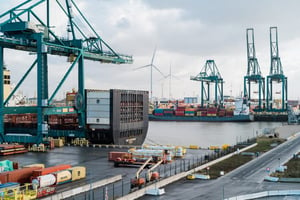MARITIME TRANSPORT: FUELS, EMISSIONS & SUSTAINABILITY
Our Carbon Reduction Scientist, Nathan Wood has been working on a shortened version of our ‘Maritime Transport – Fuels, Emissions & Sustainability’ white paper, detailing the issues surrounding carbon reduction in the maritime transport industry.
-1.jpg?width=200&height=300&name=Tunley%20Headshots%20(13)-1.jpg)
NATHAN WOOD
CARBON REDUCTION SCIENTIST
EXCERPT
The shipping industry is a key economic driving-force of the world economy, with roughly 90% of traded goods reliant on shipping. However, the current generation of ships and most port infrastructure are heavily reliant on fossil fuels.
In recent years there have been a number of regulations and targets put in place to reduce the greenhouse gases (GHG) produced by the shipping industry. The International Maritime Organization (IMO) has set strict goals to reduce the carbon footprint of international shipping by at least 40% by 2030, compared to 2008 levels. By 2050, the 2021 EU Green Deal sets goals for port cities to reduce their greenhouse gas emissions by 90%. The EU has also openly stated the need to include shipping in its Emissions Trading System (ETS), which places annual limits on company emissions and imposes financial penalties on those who exceed the limits.
Approximately 2.5% of the world's CO2 emissions, or 940 MtCO2 per year, are attributed to shipping. The current fuel of choice for the shipping industry is heavy fuel oil (HFO), making up 72% of the total fuel consumption. A central issue with HFO is the release of pollutants such COx, NOx and SOx and particulate matter (PM) when combusted. According to estimates, 13% of the world's SOx emissions come from the shipping sector. Emissions of SOx and NOx are of particular concern to human health. SOx can often exist as PM2.5, particles small-enough to enter directly into the human bloodstream through the lungs, contributing to a variety of health concerns.
With a variety of potential fuel types available, the shipping industry is determinedly moving towards alternative fuels to decrease its environmental footprint. Potential future fuels like hydrogen and liquid natural gas (LNG) are gaining popularity. Nevertheless, these decisions raise concerns about sustainability and reliance on fossil fuels.




